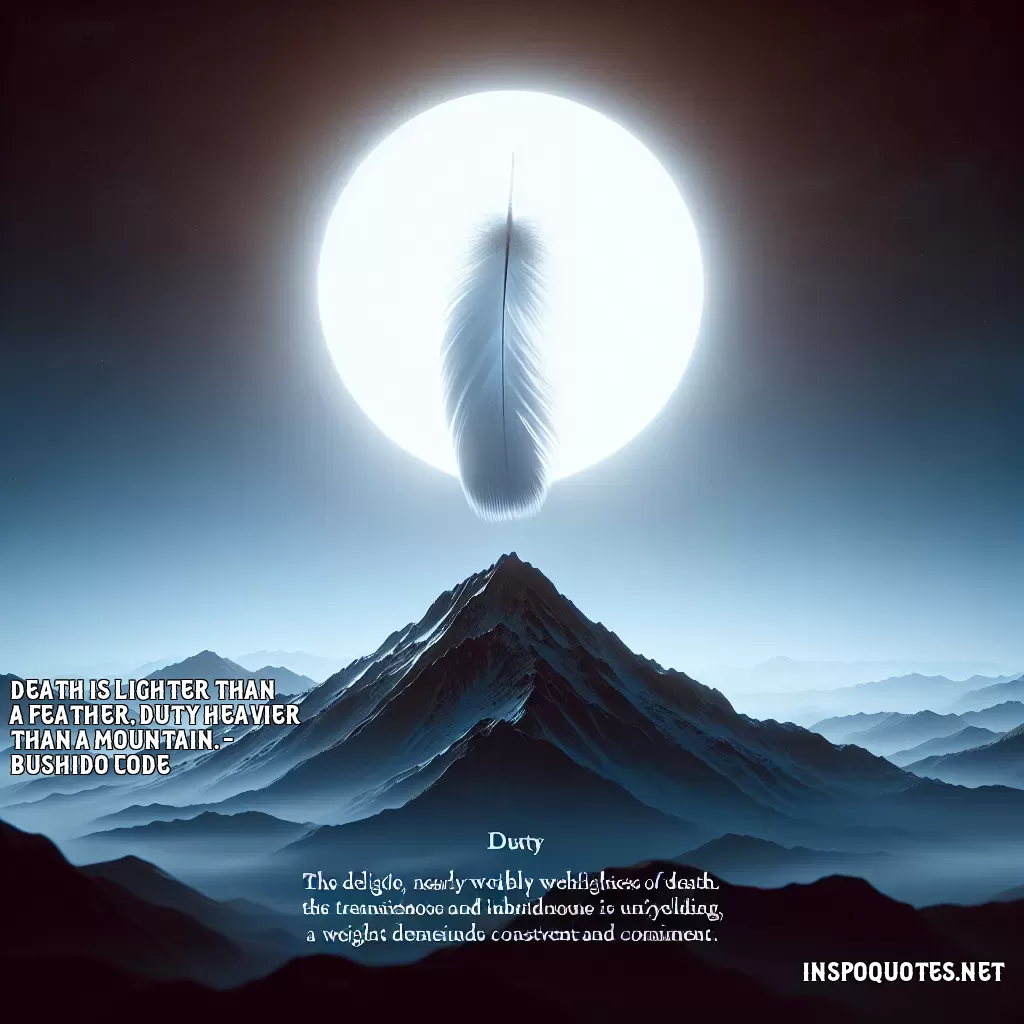
Death is lighter than a feather, duty heavier than a mountain. - Bushido Code
Author: Bushido Code
👁️ 6 views

Death is lighter than a feather, duty heavier than a mountain. - Bushido Code
👁️ 6 views
The quote "Death is lighter than a feather, duty heavier than a mountain" is a profound expression of the values embodied in the Bushido Code, the ethical framework followed by the samurai in feudal Japan. This aphorism emphasizes the core principles of honor, duty, and the stoic acceptance of one's responsibilities in life. In this phrase, death is described as "lighter than a feather," suggesting that for a samurai, the end of life is of little consequence when compared to the weight of one's obligations. Death, in this context, is portrayed as a fact of life that is inevitable and, in some respects, inconsequential when compared to the importance of fulfilling one's duties. It implies that the fear of death should not deter an individual from carrying out their responsibilities; rather, it should be accepted with grace and readiness. On the other hand, "duty" is described as "heavier than a mountain." This metaphor indicates the immense weight and significance attached to one's obligations, whether they are to family, society, or a particular cause. For the samurai, duty was paramount, often surpassing personal desires or fears. Carrying out one's duties with integrity, even to the point of risking one's life, was seen as the ultimate expression of honor and virtue. The juxtaposition of death and duty in this quote highlights the Bushido Code's prioritization of ethical conduct over mere survival. By embracing duties despite their daunting nature, individuals affirm their commitment to a life of purpose and honor. This perspective encourages one to rise above selfish fears and live in service of principles that transcend individual existence, promoting a legacy defined by selflessness and honor.
Quote By: Bushido Code
**Bushido Code: The Way of the Warrior**
Bushido, often translated as "the way of the warrior," is a code of conduct associated with the samurai, Japan's noble warrior class. This ethical framework has its roots in the medieval period of Japan, particularly during the Kamakura period (1185-1333) and the subsequent Muromachi period (1336-1573). The term "Bushido" first emerged in the 17th century, and its principles were influenced by various philosophies, including Confucianism, Zen Buddhism, and Shinto beliefs, weaving a comprehensive moral and ethical fabric for samurai life.
The authorship and specific origins of Bushido are not attributed to a single individual; instead, it evolved through a combination of laws, philosophies, and traditions passed down through generations. However, many scholars emphasize the writings of several key historical figures in shaping the Bushido code. One prominent influence is Yamamoto Tsunetomo, a former samurai who penned "Hagakure" in the early 18th century. This text encapsulated various aspects of Bushido and reflected on the life and spirit of the samurai. Through Tsunetomo's writings, the essence of loyalty, honor, and the acceptance of death became foundational to the samurai ethos.
Another influential figure in the development of Bushido was Miyamoto Musashi, a famed swordsman and philosopher, whose work "The Book of Five Rings" focused on strategy, martial arts, and the deeper understanding of life and death. Musashi’s contributions emphasized the importance of an unyielding spirit and the necessity of self-discipline, concepts that are central to Bushido.
The principles of Bushido include loyalty, bravery, veracity, benevolence, righteousness, and self-control, collectively shaping the behavior of warriors in feudal Japan. These values guided samurai in their duties to their lords and dictated their actions in battle and peace. Even today, remnants of the Bushido code continue to influence Japanese culture, societal values, and martial arts practices, ensuring that the legacy of Bushido remains a significant part of Japan’s historical narrative. Through the examination of these philosophical roots and historical figures, one sees that the Bushido code is not merely an ancient tradition but a living legacy that continues to inspire ideals of honor and integrity.